The Worst Mistakes Everyone Makes Cooking Eggs, According to a Chef
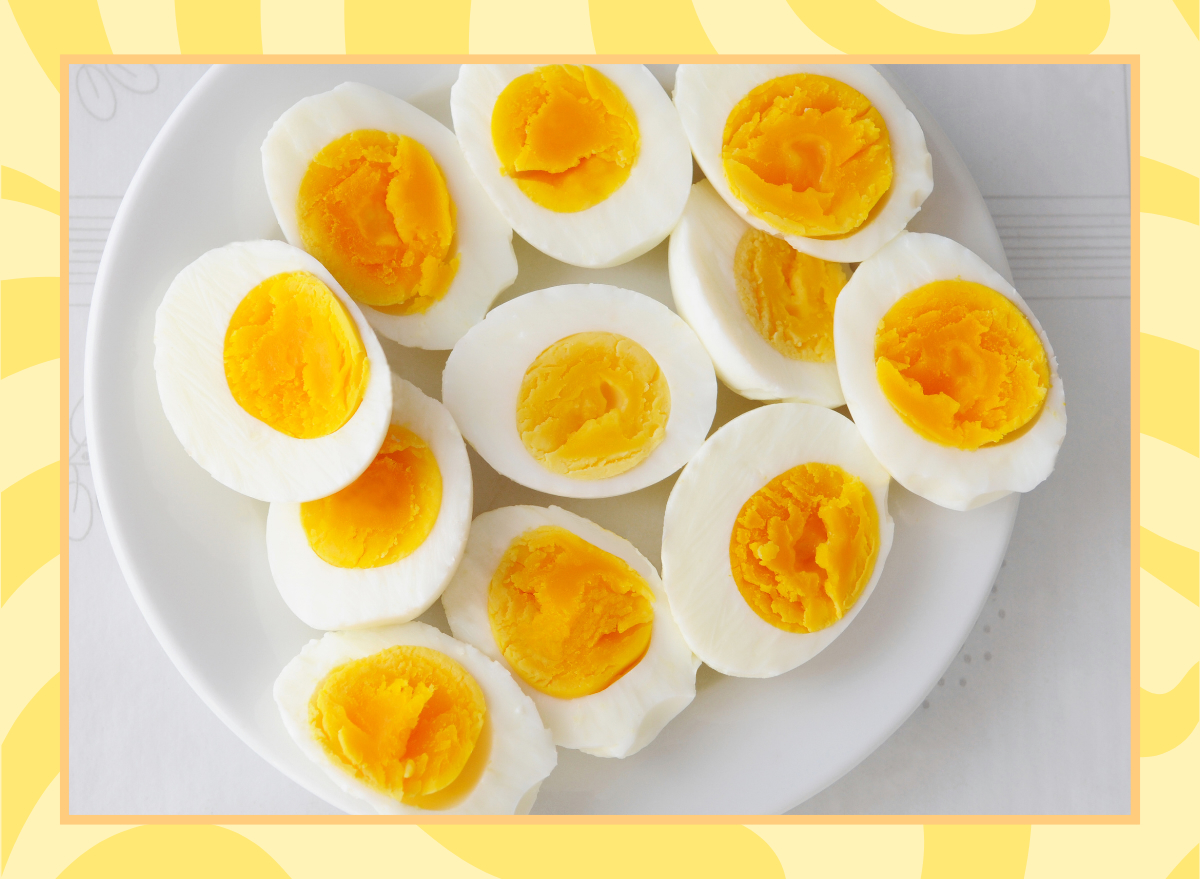
Eggs are the quintessential breakfast food and, unlike some of our other favorites—waffles, pancakes, bagels—they're a healthy way to start the day. Eggs raise your HDL (otherwise known as your "good cholesterol") and have other health benefits including providing a good protein boost, building muscle, keeping your bones strong, and reducing inflammation.
The other great thing about eggs is that there are so many ways to prepare them. But whether you prefer your eggs scrambled, poached, or in an omelet, one thing is for sure: when eggs aren't cooked properly, they aren't exactly a gift to our taste buds.
Looking to up your egg cooking game? We spoke with chef Yasmeen AlSawwaf about the most common mistakes people make when cooking eggs and she shared her do's and don'ts for cooking every type of egg dish. Plus, find out the #1 Healthiest Way to Cook an Egg.
Boiled Eggs
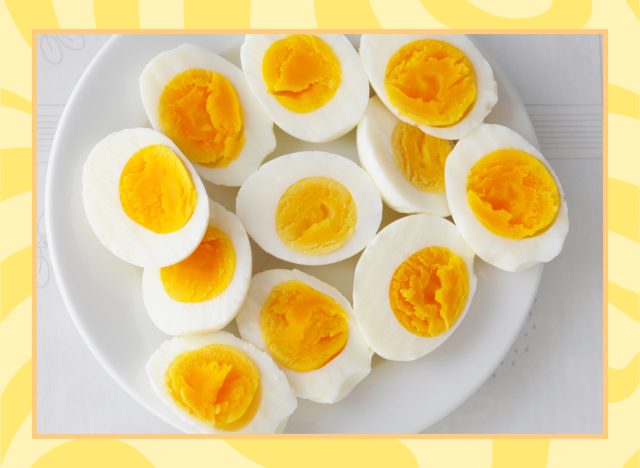
Mistakes: When it comes to boiling eggs, AlSawwaf says the most common mistakes are:
- Cooking cracked eggs
- Cooking the eggs in a shallow pot
- Not adding enough water to the pot
- Not salting the water
- Cooking the eggs in boiling water
- Peeling the egg when it's cold
What To Do Instead: First things first: AlSawwaf says it's important to select uncracked eggs when you're making boiled eggs. The pot selection also matters. "Select a pot that's deep enough for the eggs to be fully submerged into the water," she advises. "Make sure to fill up the pot with water until it covers the eggs by at least two inches."
Next, AlSawwaf says it's time to salt the water that you're using to boil the eggs because salted water boils faster — but you don't want to bring it to a rolling boil. "Eggs should be cooked in a simmer," says AlSawwaf. "There's a risk for the eggs to crack and overcook when they're violently boiling. A gentle simmer is best to ensure even cooking. Place your eggs with a slotted spoon into the simmering water. Hard-boiled eggs can be started in simmering or coldwater, however soft- and medium-boiled eggs should begin with simmering water."
Timing is also key and AlSawwaf explains that the timing of your eggs starts as soon as the water begins to simmer. "For example, a six-minute egg is timed as soon as the water returns to a simmer; only then can we begin the cooking countdown," she says. "Another example is hard-boiled eggs. If you added the eggs into cold water, timing only begins after the water begins simmering and only then can you begin counting down your ten to 12 minutes."
Poached Eggs
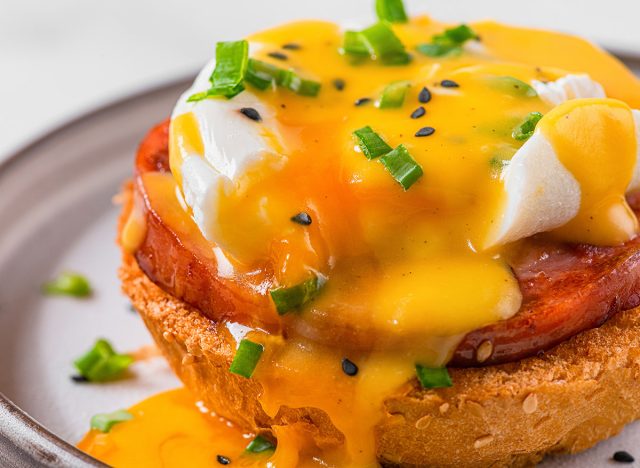
Mistakes: AlSawwaf says the most common mistakes people make when cooking poached eggs are:
- Not adding vinegar to the poaching liquid
- Choosing a pot that's not deep enough for the poaching process
- Keeping the water too hot
- Not using fresh eggs
- Using the same bowl to crack all your eggs
What To Do Instead: "Add salt and vinegar to your poaching liquid," AlSawwaf advises. Doing this makes the egg protein set more quickly and helps avoid streaks of white from spreading everywhere.
In order to ensure that the egg yolk and whites remain as perfect as possible, be sure to crack each egg in a separate bowl. When it's time to start cooking, AlSawwaf says to use a pot that's at least six inches deep; this ensures that your final product will have a good "teardrop" shape."Drop the egg into the simmering water, the egg will sink down to the bottom at first and slowly float on top, forming a teardrop shape," she says. "It takes about three to four minutes for a perfectly poached egg. Having more than one poached egg into the water means that the temperature will drop, so the eggs might need more time to be perfectly cooked." Finally, remove the egg from the pot using a slotted spoon and put it on a paper towel to dry.
Fried Eggs
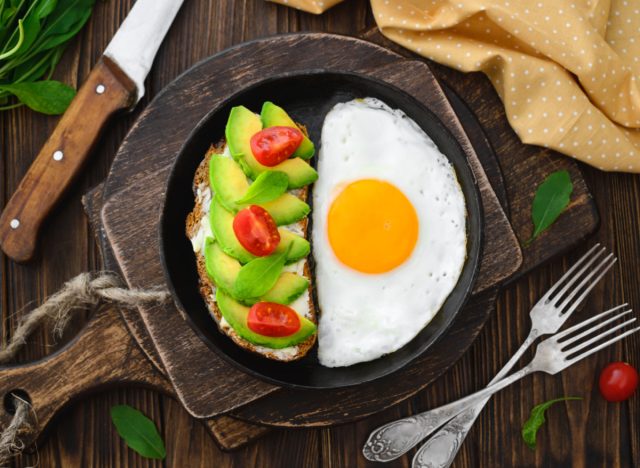
Mistakes: AlSawwaf tells us that the most common mistakes people make when cooking fried eggs are:
- Not using fresh eggs
- Not using oils or fats
- Not using a non-stick pan
- Using heat that's too high
- Breaking the egg directly on top of the pan
What To Do Instead: "Fresh eggs are essential for perfectly fried eggs," says AlSawwaf. "When an egg ages, the whites and yolk thin out. This means that the white will spread instead of being compact and thick and the yolk won't sit atop the whites perfectly." She also recommends using an oil like clarified butter or butter, noting that it will "add a lovely flavor to the cooked eggs." And don't forget to use a non-stick pan, otherwise, you could end up with a mess on your hands.
Eggs should be fried on medium heat. AlSawwaf says the best temperature for frying eggs is between 255°F to 280°F. "Having high heat means that the eggs could brown and blister before being properly cooked in the center," she explains. "Fried eggs should be shiny and have fully set whites and shouldn't be blistered or browned, while the yolks should be properly cooked according to your preference."
AlSawwaf also cautions against cracking eggs directly on the pan. Instead, crack them in a separate bowl to ensure the yolks don't break.
If you want to cook your egg sunny-side up, add sprinkles of water inside the pan, then cover them to steam the eggs and cook the yolks. If you prefer over-easy, AlSawwaf says to flip the egg with a spatula and baste it with butter until it reaches your desired doneness.
Scrambled Eggs
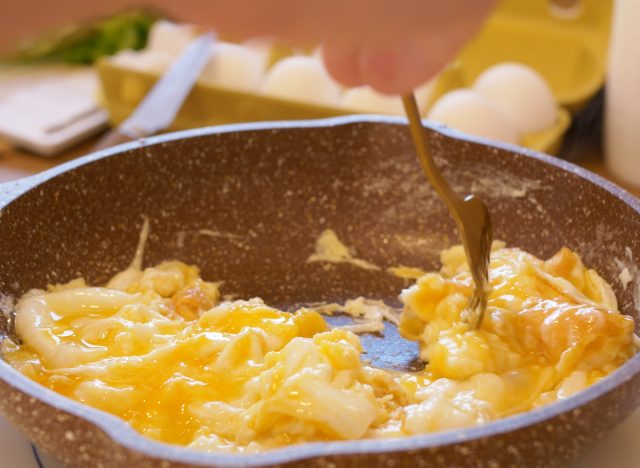
Mistakes: When making scrambled eggs, AlSawwaf says the most common mistakes are:
- Mixing the cheese and herbs into the bowl with the eggs beforehand
- Not adding stock, water, or cream to the scrambled eggs mixture
- Cooking the eggs on consistently high heat
- Not removing the scrambled eggs from the heat at the right time
What To Do Instead: "Add a small amount of stock, about two teaspoons per egg, to your beaten eggs. As the water evaporates, the egg will become puffier," says AlSawwaf. "Milk and cream may also be added to the beaten eggs to enrich your scrambled eggs." Two to three minutes before your scrambled eggs are ready is the correct time to mix in cheese, herbs, or any other add-ins you like in your eggs. Fold in these ingredients when the eggs are almost done.
Next, melt your fat over medium heat before pouring the eggs. "The eggs will begin to coagulate almost immediately," says AlSawwaf. Then turn your heat down to low and continue stirring the egg mixture. "The lower the heat and the more constant your movement, the creamier your scrambled eggs will be," explains AlSawwaf. Alternatively, she says you can remove the eggs completely from the heat to stir every minute during the cooking process.
Finally, remove the eggs from the heat when they're slightly underdone. AlSawwaf explains that the residual heat from the pan will continue cooking the scrambled eggs — so if you remove them from the heat when they're perfectly done, the residual heat will overcook them.
Omelets

Mistakes: AlSawwaf noted there are a number of mistakes that can ruin your omelet. The most common are:
- Beating the eggs too much or for too long
- Using a pan that's too small or too large for the number of eggs
- Selecting an omelet filling that overpowers the delicate flavors of the eggs instead of complementing it
- Not having all your ingredients in place before cooking the eggs
- Adding your filling and garnishes too late
- Seasoning the omelet from the very start
What To Do Instead: "Beat your eggs until the whites and yolks are incorporated," says AlSawwaf. "Do not beat until the eggs are frothy or incorporate too much air."
For flat omelets that don't require stirring, AlSawwaf says that the time to add omelet garnishes and fillings is when you're beginning to cook. For folded or rolled omelets, fillings should be added when the omelet is almost done.
"You may add two teaspoons of stock per egg or cream to the omelet mixture to have a richer and creamier result," AlSawwaf suggests. "Using clarified butter is a common thing for omelets, but oils are also good to use." Finally, wait until you're as close to finishing your omelet as possible before you add the seasonings.
Sign up for our newsletter to get daily recipes and food news in your inbox!
Read more:
The Quickest Recipes Ever According to Chefs








